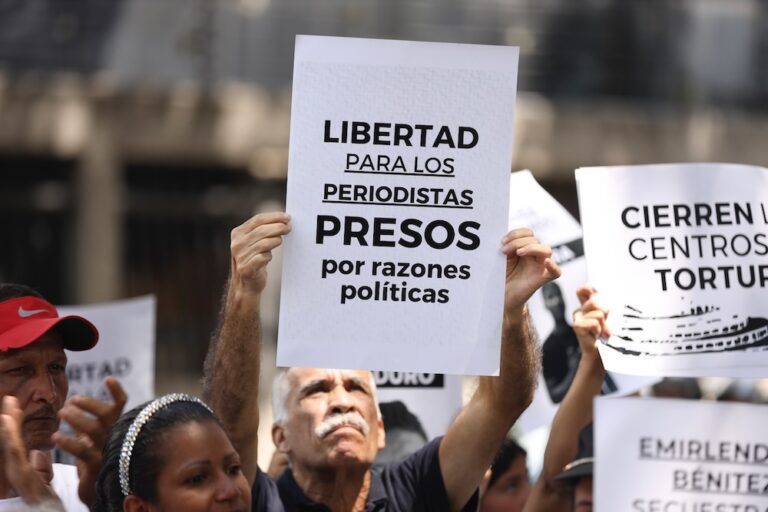The Arab world was the motor of history in 2011 but the Arab uprisings have had contrasting political outcomes so far, with Tunisia and Bahrain at opposite ends of the scale.
(RSF/IFEX) – The following is an overview of RSF’s Press Freedom Index report for the year 2011/2012.
Syria, Bahrain and Yemen get worst ever rankings
“This year’s index sees many changes in the rankings, changes that reflect a year that was incredibly rich in developments, especially in the Arab world,” Reporters Without Borders said today as it released its 10th annual press freedom index. “Many media paid dearly for their coverage of democratic aspirations or opposition movements. Control of news and information continued to tempt governments and to be a question of survival for totalitarian and repressive regimes. The past year also highlighted the leading role played by netizens in producing and disseminating news.
“Crackdown was the word of the year in 2011. Never has freedom of information been so closely associated with democracy. Never have journalists, through their reporting, vexed the enemies of freedom so much. Never have acts of censorship and physical attacks on journalists seemed so numerous. The equation is simple: the absence or suppression of civil liberties leads necessarily to the suppression of media freedom. Dictatorships fear and ban information, especially when it may undermine them.
“It is no surprise that the same trio of countries, Eritrea, Turkmenistan and North Korea, absolute dictatorships that permit no civil liberties, again occupy the last three places in the index. This year, they are immediately preceded at the bottom by Syria, Iran and China, three countries that seem to have lost contact with reality as they have been sucked into an insane spiral of terror, and by Bahrain and Vietnam, quintessential oppressive regimes. Other countries such as Uganda and Belarus have also become much more repressive.
“This year’s index finds the same group of countries at its head, countries such as Finland, Norway and Netherlands that respect basic freedoms. This serves as a reminder that media independence can only be maintained in strong democracies and that democracy needs media freedom. It is worth noting the entry of Cape Verde and Namibia into the top twenty, two African countries where no attempts to obstruct the media were reported in 2011.”
Protest movements
The Arab world was the motor of history in 2011 but the Arab uprisings have had contrasting political outcomes so far, with Tunisia and Bahrain at opposite ends of the scale. Tunisia (134th) rose 30 places in index and, with much suffering, gave birth to a democratic regime that has not yet fully accepted a free and independent press. Bahrain (173rd) fell 29 places because of its relentless crackdown on pro-democracy movements, its trials of human rights defenders and its suppression of all space for freedom.
While Libya (154th) turned the page on the Gaddafi era, Yemen succumbed to violence between President Ali Abdallah Saleh’s opponents and supporters and languished in 171st position. The future of both of these countries remains uncertain, and the place they will allow the media is undecided. The same goes for Egypt, which fell 39 places to 166th because the Supreme Council of the Armed Forces, in power since February, dashed the hopes of democrats by continuing the Mubarak dictatorship’s practices. There were three periods of exceptional violence for journalists: in February, November and December.
Already poorly ranked in 2010, Syria fell further in the index, to 176th position, because total censorship, widespread surveillance, indiscriminate violence and government manipulation made it impossible for journalists to work.
Elsewhere in the world, pro-democracy movements that tried to follow the Arab example were ruthlessly suppressed. Many arrests were made in Vietnam (172nd). In China (174th), the government responded to regional and local protests and to public impatience with scandals and acts of injustice by feverishly reinforcing its system of controlling news and information, carrying out extrajudicial arrests and stepping up Internet censorship. There was a dramatic rise in the number of arrests in Azerbaijan (162nd), where Ilham Aliyev’s autocratic government did not hesitate to jail netizens, abduct opposition journalists and bar foreign reporters in order to impose a news blackout on the unrest.
Led by President Yoweri Museveni, Uganda (139th) launched an unprecedented crackdown on opposition movements and independent media after the elections in February. Similarly, Chile (80th) fell 47 places because of its many freedom of information violations, committed very often by the security forces during student protests. The United States (47th) also owed its fall of 27 places to the many arrests of journalist covering Occupy Wall Street protests.
(. . .)


